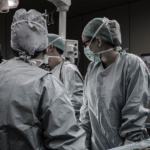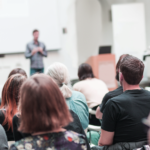“Sorry, I can’t hang out. I’m practicing social isolation!”
While variations of those words have become a cliché during this time of pandemic, anyone with the (mis)fortune to befriend a medical student has already heard them in relation to the medical licensing exams. Med students usually take the first of these, known as Step 1, toward the end of their second year. Most schools allow four to eight weeks of preparation for this exam, which plays a large role in determining each student’s medical specialty and residency location. In 2020, this time of anxious studying became indistinguishable from quarantine in general, as one month grew into an indefinite purgatory of half a year or longer. Emerging from that strange incubation in the fall, many students feared that they might be malformed, unprepared to face their rescheduled exams and entry into clinical medicine.
Even before the pandemic, however, the dedicated period of Step 1 studying was already notorious among med students for bringing out the angst of previously repressed questions of meaning. Personally, I struggled with the problem of the humanities in medicine. As a former liberal arts student, my tools––textual criticism, intellectual history, analyzing contemporary rituals and practice––seemed irrelevant to my new tasks of memorizing vast amounts of information and learning medical techniques. Was the decision to study medicine a decision to give up humanistic learning? What could the humble wisdom of the humanities say to a healthcare apparatus that uses medicine as a means of power and control, seeking primarily to maximize autonomy (of the rich, administrators, corporations, or occasionally individual patients)?
Was the decision to study medicine a decision to give up humanistic learning? What could the humble wisdom of the humanities say to a healthcare apparatus that uses medicine as a means of power and control, seeking primarily to maximize autonomy? I wondered if I’d made the bargain of Faust.
Start your day with Public Discourse
Sign up and get our daily essays sent straight to your inbox.During one study break recalling old readings related to this problem, I wondered if I’d made the bargain of Faust. This iconic literary figure offers important lessons for all who struggle with the question of whether medicine requires sacrificing the humanities. In particular, Goethe’s version of the legend reminds us that if medicine is to avoid the self-absorption of a technocratic will to power, it must retain a teleological understanding of health as directed toward human flourishing.
Modern Faustian Bargains in Medical Education
Goethe’s Faust embodies the physician of yesteryear, whose skill in medicine and the natural sciences accompanies his expertise in theology, philosophy, human behavior, and literature. He is called a doctor in its original Latinate sense: a teacher. He has mastered many areas of knowledge to employ them as he pleases in instructing others, researching, or improving human life. Being a physician is just one of his many roles.
The play revolves around a deal Faust makes with the devil, which involves several implicit exchanges. Faust forsakes theology and liberal learning to pursue pure techne, the ability to manipulate the material world to produce the technician’s desires. Faust has lost patience with scholarship as a way to find meaning in life, and he agrees to receive the devil’s aid in acquiring any pleasure or experience he wishes, on the condition that his soul is forfeit once he finds satisfaction in this life. This is the origin of the term “Faustian bargain”: trading what is morally good or eternally significant for a temporary good.
Within the first few days of starting classes, many medical students may wonder whether they’ve unwittingly done the same. From orientation onward, my own school’s curriculum exhorts us to make time for “wellness” to stave off the menace of physician burnout. Burnout is a well-documented problem in the medical community; it affects around half of physicians and contributes to the high rate of physicians leaving medical practice, the worsening issue of depression among physicians, and even the 14 percent who report suicidal ideation. Proposed contributing factors include poor work-life balance, excess bureaucracy, lack of autonomy, and disproportionate time spent dealing with insurance and electronic medical records (two hours for every hour of patient care!). Clearly, many physicians become disappointed with whatever benefits materialize in exchange for the training and hard work of building their practices, and schools are recognizing the long-term danger of burnout to our already scarce supply of physicians.
In addition to the future possibility of becoming jaded, some immediate humanistic pitfalls accompany the student deciding to practice medicine. In an affront to Goethe’s romanticism, those in medicine sacrifice the days of their youth for years of study before they can practice independently, losing much of their autonomy by assuming the lowest position in the medical hierarchy. In Faust’s words, they become “too old to be content with play, too young to be without desire” as they subsume youthful self-expression under ideas of professionalism. By joining a medical culture that demands obedience and individual effacement for the sake of performance, students miss out on developing their moral faculty in a way that humanistic education would allow young people to do.
The purpose of a liberal education is to liberate the mind, giving it the critical tools to pursue the good freely. Contemporary medical education, by contrast, can stunt moral development with its insistence on memorizing protocols and quick responses to test questions.
The purpose of a liberal education is to liberate the mind, giving it the critical tools to pursue the good freely. Contemporary medical education, by contrast, can stunt moral development with its insistence on memorizing protocols and quick responses to test questions. This approach neglects the real philosophical discipline of ethics, and it discourages students from critically reflecting on systems of meaning and how moral decisions and ways of living follow from those systems. When unexamined, good principles—such as patient autonomy or justice—can become distorted, as if they were ends unto themselves. They become the limits of students’ moral imaginations rather than their guides.
Studies of both individual med schools and larger trends in medical education demonstrate a troubling problem of moral development, as students do not advance their reasoning in a way expected for their age (when measured by scales such as Kohlberg’s stages of moral development). Med students actually show a significant decrease in weighted average scores of moral reasoning after three years of medical education.
Medicine and Human Flourishing
Burnout, the forfeiting of youthful discovery, and stagnation in moral development all stifle human flourishing. When we start seeing medical techne as a tool for pure autonomy, we lose a meaningful understanding of health as connected to that human flourishing. It would certainly be troubling, for both physicians and society, if medical education removed the humanistic qualities so essential to the therapeutic relationship. However, the relationship between contemporary medical education and humanism is more nuanced than a simple exchange of one for the other.
Times of crisis, such as the current pandemic, reveal a core humanistic impulse that persists by some unseen grace. I’m struck by the commitment of my classmates and med students around the country to serve others. Many demonstrate their willingness to put themselves at risk in order to relieve suffering and protect others’ health.
In the early days of the pandemic, students organized and participated in many creative and selfless projects. Some collected and assembled personal protective equipment (PPE) for other healthcare workers, while others began writing letters, to advocate for prisoners and ICE detainees with medical conditions that made them more vulnerable to contracting and suffering complications from COVID-19. There were initiatives to provide childcare for workers whose exposure prevented them from returning home often. Some students opened their school apartments and houses to the emergency department and ICU workers who had to isolate from their own loved ones. The Navy even had to clarify that they couldn’t accept volunteers, after Navy med students asked to serve on the hospital ships USNS Comfort and USNS Mercy, docked at New York City and Los Angeles respectively.
We work to enable children to play, to help friends and families have meals together again, to create music and explore nature, and to express the art of our own practice itself, which is one of the many things that make human life special.
Now that clinical learning has resumed, many are tackling their rotations with eagerness, thankful for the honor of being able to learn medicine during such a historic moment. The overall student response to the pandemic manifests a deep dedication to promoting human flourishing and using what ability we have––our limited but growing knowledge of medicine––to protect or restore something that makes that flourishing possible: bodily health. We work to enable children to play, to help friends and families have meals together again, to create music and explore nature, and to express the art of our own practice itself, which is one of the many things that make human life special.
Celebrating the Humanistic Goal of Medicine
Goethe’s nineteenth-century work celebrated these same universal goods contributing to the human flourishing that students still recognize today. In one of the play’s early scenes, Faust praises the beauty of an Easter Sunday town festival, which exemplifies the simple yet profound joy available to all people. Faust joins the townspeople’s celebrations for a time, but he feels that his learning distances him from others, and he counts himself unworthy of the thanks they give him as a physician for treating many of them during a plague. This feeling of alienation from others haunts Faust throughout the play. Never satisfied with his contribution to humanity, Faust spends his life trying to return to a simpler appreciation of the good.
In the end, Faust escapes the consequences of his deal through the intercession of those who love him. In Goethe’s account, redemption from the hellish bargain of the human condition comes from realizing that one can never be self-sufficient in bringing about lasting good: Faust needs an outside source to solve his alienation from his own humanity and to give human action some eternal significance. Modern physicians in all levels of training similarly struggle with how to find a sense of meaning in their work. For med students accustomed to viewing our success as the result of our self-sufficiency, moving outside the self and toward reliance on the Other can be difficult. However, such a movement can become life-giving once we see the “calling” of medicine as a summons too great for ourselves to bear alone.
Medicine isn’t opposed to what makes us human. At its best, it’s a practical application of the ideals of humanistic education, and its goal is to express and enable those things that distinguish us as human beings. Those practicing medicine need encouragement to cultivate a true understanding of health and health care.
COVID-19 has reminded all of us of things we truly miss as part of a good life. The task for those who provide health care is to reclaim a coherent view of human flourishing as the goal of medicine. Medical schools lack the time and resources to teach ethics and the liberal arts in a substantive way. These take a lifetime to learn. The humanistic physician takes that education into her own hands, recognizing that her technical skill is no barrier to learning from other disciplines. Our teachers include those who marry the art with the science of medicine, along with those whose love of humanity leads them to other areas of expertise outside of medicine. The health of our physicians––and thus society as a whole––depends on overcoming the Faustian bargain through a therapeutic rather than antagonistic relationship of medicine to the humanities. As the technology of medicine advances and we carry on through this pandemic, may we always advance in our commitment to human flourishing and our love for all that makes health care worthwhile.














